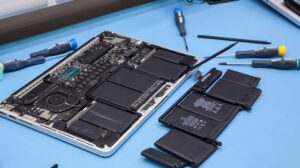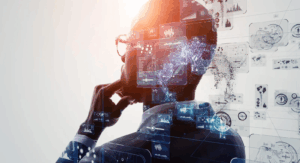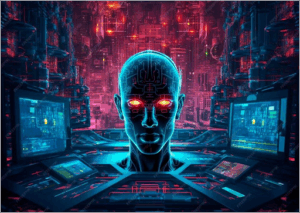
In recent years, both AI (artificial intelligence) and blockchain, have made their ways into our lives through various means and revolutionized it. They have matured independently, each revolutionizing the way we interact with data, make decisions, and ensure security. But, as these technologies amalgamate, it has created a powerful synergy. AI’s role in blockchain is to redefine how blockchain’s networks function, scale and adapt to diverse conditions. Together, they form a smart ledger that is also called the Intelligent Ledger.
This blog explains the convergence of AI and Blockchain, the latest innovations that arise with intersection of these two domains. Along with this, we will also cover how this integration is reshaping digital ecosystems and industries.
AI and Blockchain: Understanding the Fundamentals
Before diving into AI’s role in blockchain, let us understand what these both technologies are about.
What is Blockchain?
Blockchain is a decentralized digital ledger technology that records all the transactions in multiple separate nodes in such a way that they remains secure, transparent, and immutable. Each of these transactions are stored in separate blocks, AKA “block”. Later these blocks are linked to the previously created blocks to create a chronological order called a “chain”.
Blockchain ensures that data once recorded cannot be altered or deleted without alerting the concerned parties. It performs it by maintaining them on a network of nodes, rather than a central authority. This makes it ideal for industries that require higher-level of trust, tamper-proof recording, and traceability such as, healthcare, finance, supply chain, and governance.
Key benefits:
Security: cryptographic principles in blockchain secure the data.
Transparency: it allows everyone on the network to view transactions
Decentralization: data is secured in multiple separate nodes and not owned by any central authority.
Immutability: transactions cannot be altered without traceability.
What is AI (Artificial Intelligence)?
AI is the technology behind developing systems that can automate and independently perform tasks that otherwise require human intelligence. This includes NLP (Natural Language Processing), pattern recognition, learning from data, and decision making.
Key features of AI are:
- Automation: automating recurring, manual tasks.
- Optimization: improving performance and enhancing decision making
- Prediction: forecasting outcomes after analyzing data sets.
- Adaptability: improving over time with constant learning. Artificial intelligence, independently, creates intelligent systems, but, when combined with blockchain, the real magic begins.
AI’s Role in Blockchain: How it Enhances its Functioning
AI’s integration into the blockchain is more than just a technical advancement. It is a shift in how trust, automation, and intelligence are integrated into the digital infrastructure and its perception is transformed completely.
Smarter Data Management
Though blockchains are secure, they are not designed to handle big chunks of data throughput. Therefore, making the storage of large data sets directly on-chain inefficient. To overcome this, AI offers advanced filtering, classification, and compression techniques that allows you to:
- Process data in advance before adding it to blockchain
- Analyze off chain data to generate verifiable hashed summaries for on-chain storage.
- Provides real-time insights to improve decision making
For example, when you hire a Blockchain development company in India to make your supply chain application, they create a system to analyze sensor data such as temperature and humidity to optimize storage.
Smart Contract Optimization
These are self-executing codes that run on blockchain. They follow and run on strict rules, but lack the flexibility to adapt to the complex, changing scenarios.
AI can help in making blockchain smart contracts smarter by:
- Incorporating machine learning models to handle anomalies and exceptions.
- It enables contracts to learn from past interactions and optimize their logic, time and again.
- Helping NLP to translate legal documents into executable codes.
This way it helps in making smart contracts more versatile for real world use cases like financial derivatives, legal arbitrations, and insurance.
Better fraud detection and enhanced security
While AI and blockchain, both are powerful on their own, together they offer an unbreakable defense system.
- AI detects fraud patterns and anomalies in transactions real-time.
- Blockchain provides AI models with a transparent and immutable trail of actions to analyze.
- Machine learning algorithms can predict and prevent future actions in advance.
This holds key importance in decentralized finance that has high stakes and traditional oversight is minimal.
Sectors Using Intelligent Ledger
Intelligent ledger is not a theory anymore. Various sectors are already using its potential.
Finance Sector:
In the finance sector, while blockchain ensures auditability and transparency, AI-enabled bots monitor and execute trades on decentralized exchanges. Along with this, risk assessment models, backed by AI, work towards determining collateral requirements in real-time lending protocols.
Healthcare Sector:
Healthcare companies hire AI developers in India to create an AI system that analyzes patients’ data to offer diagnostics. While blockchain ensures patients’ records remain secure and are shared across institutions without privacy breaches.
Supply Chain:
AI works on optimizing supply chains end-to-end. It optimizes routes, track disruptions, monitors quality, and predicts demands. And blockchain works on recording every transaction, creating traceable proofs of product’s journey that are tamper-proof.
Legal Tech:
AI processes legal documents for key clauses, compliances, and risks. While blockchain works on time stamping and recording contracts, and providing an immutable trail of legal agreements.
Challenges for AI and Blockchain
AI’s role in blockchain might be integral, but full of challenges, let’s take a look at them and how to overcome them.
Data Privacy: solutions like zero-knowledge proofs and federated learning are being explored to overcome the challenge of blockchain being public and transparent, while AI needs access to data.
Resource Intensiveness: Both blockchain and AI require massive computational power. Efficient off-chain computation and edge AI are emerging as powerful solutions to assist them.
Ethics & Biasness: AI can be biased. If remain unchecked, these can become immutable by blockchain recordings.
Overcoming these challenges are crucial for optimizing the full potential of the intelligent ledger. Hire blockchain developers in India, who are skilled, to help you overcome individual AI and blockchain challenges. Their experience can help you create an exemplary application, seamlessly.
Conclusion
AI and blockchain are integrating to form a powerful alliance that is set to redefine the scope of data management, decision making, and establishing trust. By integrating AI with blockchain, there are unprecedented levels of transparency, security, and automation.





